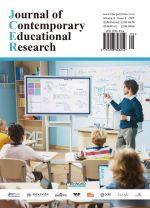Innovation in English Translation Teaching based on Artificial Intelligence
Abstract
English translation teaching must also evolve against the backdrop of rapid advancement in AI. There are many problems and limitations in the traditional English translation teaching model, such as students’ over-reliance on translation software, teachers’ insufficient understanding of intelligent technology and insufficient integration of teaching and intelligent technology, which cannot meet the diversified learning needs of students. This paper tries to explore Innovative strategies for Artificial Intelligence (AI) based English translation teaching, including enhancing students’ understanding and application of translation software, optimizing teachers’ thinking on the application of AI technology, expanding ways to integrate translation courses with AI technology and increasing attention to AI in the course evaluation process. It aims at promoting AI-based English translation teaching and cultivating qualified English translators who meet the needs of the times.
References
Wang H, Li Z, 2019, A Survey on the Application of Translation Technologies by Translators in the AI Era: Current Situation, Findings and Suggestions. Computer-Assisted Foreign Language Education, 2019(6): 67–72.
Zhang A, Yang Z, Liu C, et al., 2018, A Preliminary Study on the Coupling Mechanism Path between the Development of AI Technology and Professional Interpretation and Translation Practice. Computer-Assisted Foreign Language Education, 2018(3): 88–94.
Wu Q, 2021, Translation Teaching in the Internet Era: Current Situation, Concepts and Prospects. Chinese Translators Journal, 42(1): 75–80.
Chen Q, 2011, A Study on the Blended Learning Model of Translation Teaching Based on Online Translation Training Platform. Computer-Assisted Foreign Language Education, 2011(2): 56–60.
Shu X, 2021, Practical Exploration of Progressive Translation Teaching Workshop Based on Workplace Learning in AI Environment. Computer-Assisted Foreign Language Education, 2021(2): 65–72.
Liu H, 2020, Innovation and Development of Distance Translation Major Teaching Management. Chinese Translators Journal, 41(6): 66–68.
Zhao W, 2020, Discussion on Translation Teaching for Translation Majors in the Intelligent Era. English Square (Academic Research), 2020(3): 5–6.
Ge X, 2020, Analysis on the Applicability of MT + PE Mode in Texts. Campus English, 2020(48): 247–248.
Huang Y, 2020, Current Situation of AI Translation Development and Its Impact on Translation Talents. Campus English, 2020(31): 227–228.
Wang M, Liang X, 2024, Technical Translation Based on Generative AI: Advantages and Challenges. Modern English, 2024(10): 98–101.
Liu Z, Qiu Q, Zeng X, 2020, Removing “Weeds” and Reclaiming “Wasteland” for a New World: Construction and Prospect of New Ecology in Translation Employment Market Based on AI Development. Modern English, 2020(12): 52–55.
Han Z, Xu S, 2023, Exploration of Translation Engineering Education for Cultivating Translation Engineers. Foreign Language World, 2023(6): 40–46.
Li L, Chen J, Qin Y, 2024, Research on the Integration of Digital Humanities and College Translation Courses. China Construction Education, 2024(1): 98–101.
Pu L, 2021, A Preliminary Study on the Evaluation System of Translation Practice Courses: Practice and Problems. Modern English, 2021(14): 87.

